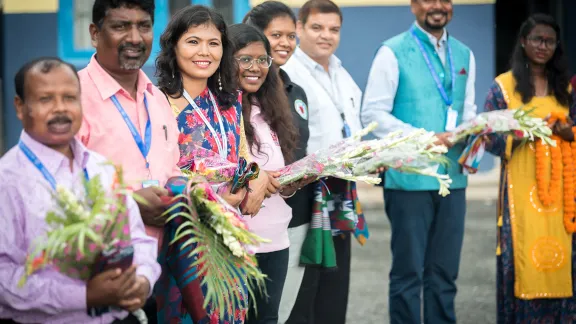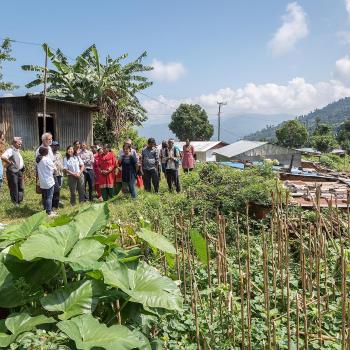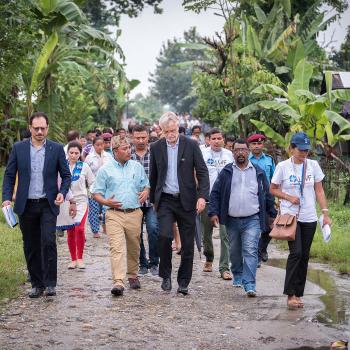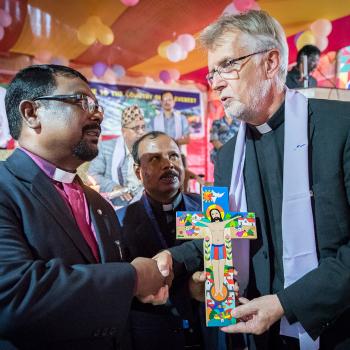
LWF staff and members of the Nepal Evangelical Lutheran Church await the arrival of LWF general secretary Rev. Dr Martin Junge at Biratnagar airport, Nepal. Photo: LWF/Albin Hillert
LWF General Secretary visits Nepal from 12-19 September
(LWI) "I have come to Nepal bearing in mind, in particular, one story,” observed Lutheran World Federation (LWF) General Secretary Rev. Dr Martin Junge upon arrival in Kathmandu.
Welcomed by Nepal Evangelical Lutheran Church president Rev. Joseph Soren and staff of the LWF country program, Junge recalled, “When the earthquake hit Nepal in 2015, you were all affected. Earthquakes do not choose between people but affect everybody. But still, I heard how many of you, while you were affected yourselves, came to the LWF office immediately to see how you could help others. This is such a strong story of our witness. We are not here to serve ourselves, but to serve others."
Junge is visiting Nepal from 12 to 19 September to participate in the 75th-anniversary celebrations of the Nepal Evangelical Lutheran Church (NELC), an LWF member church, and to visit development projects run by the church.
He is also visiting the LWF country program, which employs just over a hundred staff for humanitarian work in the country, supporting refugees, offering emergency response for earthquake and flood victims, among other projects.
The team is diverse and includes staff members from a range of Nepali ethnic groups and different faith traditions, and all joined in the call to service.
Earthquake response an entry-point to interfaith work
Although the LWF has been present in Nepal for more than three decades, the 2015 earthquake brought forth a new approach to the organization’s emergency response and development work.
Based on a 2014 Memorandum of Understanding between the LWF and Islamic Relief Worldwide (IRW) at the global level, LWF Nepal and IRW Nepal joined forces through the “Nepal Earthquake Relief Recovery and Reconstruction” project in response to the 2015 earthquake, where more than 34,000 households have been supported.
Over three years the LWF and IRW have together provided food, transitional shelter, livelihoods, psychosocial support as well as resilience building to communities in Rasuwa district.
The project has been part of the foundation to a recent LWF and IRW publication: A Faith-Sensitive Approach in Humanitarian Response: Guidance on Mental Health and Psychosocial Programming.
The interfaith response an eye-opener, and an opener of new doors
“The interfaith approach to our earthquake response was the first of a kind,” said Talha Jamal, Islamic Relief Worldwide country representative for Nepal, during a workshop on “Interfaith and Development Work” in Kathmandu on 13 September.
“It was an eye-opener and opened new doors for us. Working interfaith helped us meet the overall community anxiety towards faith-based humanitarian work, as many believe a religious approach will not be impartial, or they fear proselytism,” Jamal added.
Organized jointly by the LWF, Islamic Relief Worldwide Nepal, and Micah Nepal, the workshop brought together some two dozen religious leaders, development agencies as well as scholars from a variety of faiths, to explore how interfaith approaches can be further applied in relief and development work.
In the earthquake response, said Jamal, we could see that the interfaith approach added value in building trust in the communities. “This has been essential for the project, and for being able to balance between speed and quality in our response.”
As people of faith, we need to claim the ground of "robust moderation", thereby affirming what faith is essentially about.
Putting back on track what religion is about
“We seem to be living in a time when the foundation that ‘people in need are people to be supported’ is no longer there,” reflected General Secretary Junge.
“And we see more and more how people and even UN agencies now turn to religious organizations, relying on us to help uphold the core values reflected in the human rights framework. While at the same time in development work, we meet great interest in the potential of faith-based organizations.”
“As faith communities, we are often there before a disaster happens, we are there through the crisis, and we stay after the crisis is over. So faith communities are often a trusted entry-point to the humanitarian response,” said Junge.
“In the LWF we often speak about refugees as people who may lose many things on their way, but never their human rights. Similarly, we could say that people leave many things behind in an emergency, but never their faith. This is why a faith-sensitive approach is so important to the emergency response.”
NELC president Rev. Joseph Soren reflected, “there are still many types of gaps and many types of discrimination between religious groups in Nepal. But through this workshop, we are all working together, because we are living in the same country, the same culture.”
“I am so excited. All these religious leaders and organizations, their commitment, a day when we are going together, working together, for peacebuilding and humanitarian work in Nepal,” Soren said.
“These are the stories that are needed. As people of faith, we need to claim the ground of ‘robust moderation,’ thereby affirming what faith is essentially about,” Junge concluded.
From 12-19 September the LWF General Secretary will be visiting Nepal. He will participate in the 75th anniversary celebrations of the Nepal Evangelical Lutheran Church and visit projects run by the church. He will also visit the LWF country program, which is involved in humanitarian relief and development work with refugees and people affected by the 2015 earthquake.
By Albin Hillert.





